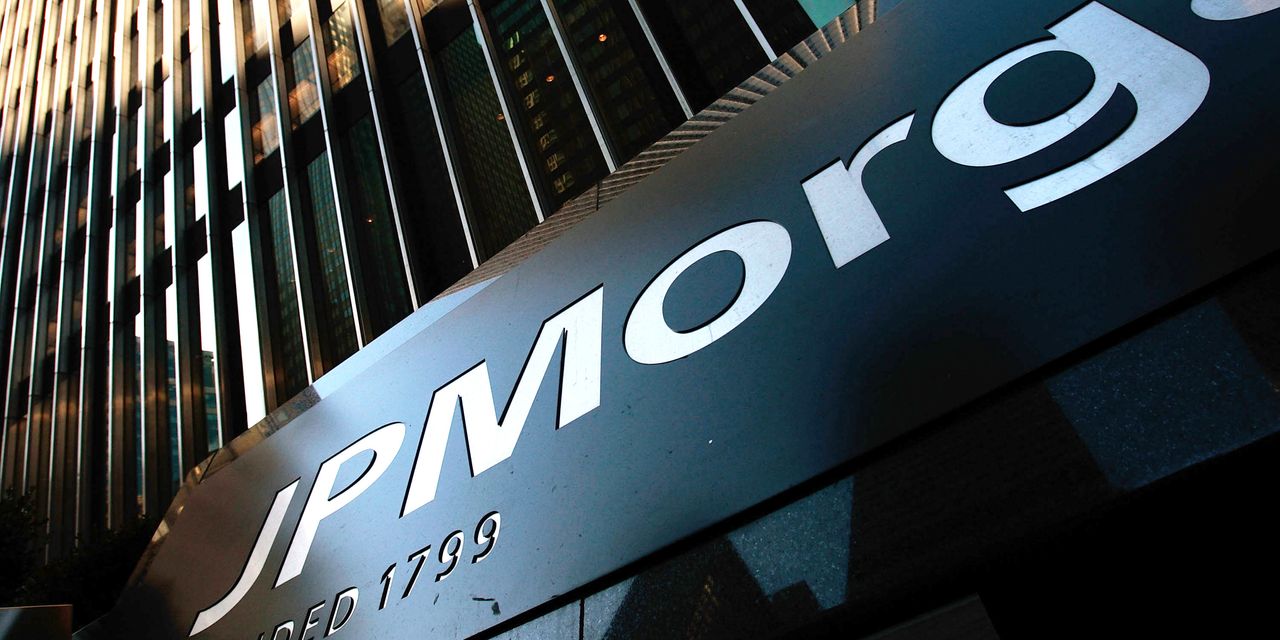JPMorgan Chase & Co. shares fell Thursday after the bank missed profit targets and temporarily suspended its stock buybacks to build up its balance sheet for an expected economic downturn, even as much of its business remains healthy.
JPMorgan Chase
JPM,
CEO Jamie Dimon said the bank performed well in the second quarter, but profits were down from the much stronger year-ago quarter when the stock market remained in rally mode and deals flowed quickly.
“The U.S. economy continues to grow and both the job market and consumer spending, and their ability to spend, remain healthy,” Dimon said. “But geopolitical tension, high inflation, waning consumer confidence, the uncertainty about how high rates have to go…”
Dimon also cited challenges from “never-before-seen” quantitative tightening by the U.S. Federal Reserve and other central banks and its effects on global liquidity, as well as a spike in energy and food prices in the wake of the war in Ukraine.
These and other factors “are very likely to have negative consequences on the global economy sometime down the road,” Dimon said.
JPMorgan’s profit for the three months ended June 30 fell to $8.65 billion, or $2.76 a share, from $11.95 billion, or $3.78 a share, in the year-ago quarter. Reported revenue rose to $30.72 billion from $30.48 billion. Managed revenue increased to $31.6 billion from $31.4 billion.
Analysts expected JPMorgan Chase to report second-quarter earnings of $2.89 a share on revenue of $31.81 billion, according to FactSet estimates.
Looking ahead, JPMorgan said it expects 2022 net interest income of $58 billion, below the latest Wall Street estimate of $62 billion.
The stock fell 2.6% in premarket trades on Thursday.
JPMorgan Chase shares are down 29.3% so far in 2022 as of Wednesday’s close. By comparison, the Dow Jones Industrial Average
DJIA,
has fallen 15.3% and the S&P 500
SPX,
has lost 20.2%.
Analysts had hiked their profit estimate for the bank from a mean of $2.79 a share as of March 31.
JPMorgan’s consumer and community banking unit booked a 15% increase in credit card spending as customers maintained robust travel and dining spending. Card loans rose 16%, with “strong” new account originations.
The firm’s global investment banking fees fell 54% against a year-ago record, but its market revenue rose 15% as clients tweaked their portfolios to navigate volatile market conditions.
Commercial banking loans increased by 7%, while asset and wealth management delivered “solid” results, Dimon said.
Bank stocks have been weak this year, leaving them cheaper compared with their five-year average price-to-earnings ratio, according to Citi analyst Keith Horowitz.
Citi on Tuesday upgraded JPMorgan Chase & Co. to buy from neutral and lowered its price target on the stock to $135 a share from $145 a share.
Horowitz said he sees potential upside on the bank’s earnings per share and that it offers a relative bargain compared to its peers.
“The stock no longer reflects premium valuation and higher capital levels (and limited buybacks) now seem priced in,” Horowitz said.
The move came as part of an overall outlook for the second-quarter earnings season for banks, which kicked off on Thursday.
“While higher interest rates are a clear positive for bank returns, investor sentiment remains negative due to concerns that Fed action will lead to large credit losses (not reflected in consensus estimates), potential breaks in financial plumbing, and the wildcard of additional regulatory action raising capital requirements,” Horowitz said.
JPMorgan Chase is one of two big banks in the 30-stock Dow Jones Industrial Average, along with Goldman Sachs Group Inc.
GS,
which is down 24.2% year-to-date. Goldman is expected to report earnings of $6.56 a share on Monday, July 18.
Also on Thursday, analysts expect Morgan Stanley to report earnings of $1.56 a share and revenue of $13.39 billion.
